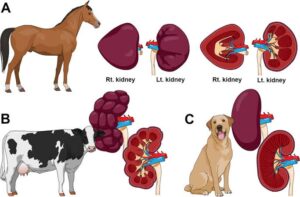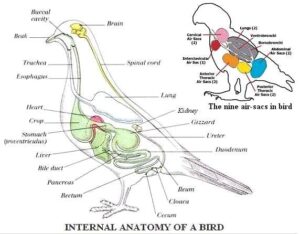Back to: ZOOLOGY 400 Level
Welcome to class!
Hello there, dedicated learner! I’m so glad to see you ready to explore another fascinating topic today. We’re diving into kidney structure and function—an essential part of your body’s system for keeping you healthy. The kidneys play a vital role in removing waste and balancing fluids, and we’re going to break it all down for you. Let’s get started!
Kidney Structure And Function
What Are Kidneys?
The kidneys are two bean-shaped organs located on either side of your spine, just below your ribs. They are part of your body’s urinary system, which helps remove waste and excess substances, like water and salts, from the blood. The kidneys also help regulate blood pressure, produce hormones, and balance important minerals in the body.

Example: Think of your kidneys like the body’s natural filters, just like how a water filter purifies water by removing impurities. They make sure everything in your body stays balanced and healthy!
Structure of the Kidney
Each kidney is made up of three main regions:
Cortex: This is the outer layer of the kidney, and it contains the structures responsible for filtering blood. The cortex has small filtering units called nephrons, which are the functional units of the kidney.
Medulla: The inner part of the kidney, shaped like pyramids, contains the renal pyramids. These help collect the filtered urine and direct it toward the renal pelvis.
Renal Pelvis: This is the funnel-shaped area that collects urine from the medulla and leads it into the ureter, which carries urine to the bladder.
Example: Imagine the kidney as a factory. The cortex is where the workers (nephrons) do the processing of blood, the medulla is like the collection area where the processed materials (urine) are gathered, and the renal pelvis is like the final storage area before the product (urine) moves out.
The Nephron: The Kidney’s Functional Unit
The nephron is the key part of the kidney that filters your blood and makes urine. Each kidney has around one million nephrons! Here’s how it works:
Glomerulus: The nephron starts with the glomerulus, a cluster of tiny blood vessels. Blood enters the glomerulus, and because of pressure, water and small molecules (like salts, glucose, and waste products) pass through the walls into the Bowman’s capsule, which is like a bowl that collects the filtered fluid.
Proximal Convoluted Tubule: The filtered fluid, now called filtrate, flows into the proximal convoluted tubule, where important substances like glucose and some salts are reabsorbed into the blood.
Loop of Henle: Next, the filtrate moves through the Loop of Henle, a U-shaped tube that helps concentrate urine by reabsorbing water and salts back into the blood, keeping the body’s water balance intact.
Distal Convoluted Tubule: After passing through the loop, the filtrate enters the distal convoluted tubule. Here, additional waste and excess ions, like potassium, are secreted into the filtrate.
Collecting Duct: Finally, the filtrate moves into the collecting duct, where more water is reabsorbed, and the remaining fluid is now concentrated into urine before being sent to the renal pelvis and eventually out of the body.
Example: Think of the nephron like a recycling plant. It takes in waste and useful materials, decides what to keep (reabsorbs essential nutrients and water), and then sends out only the waste (urine).
Functions of the Kidneys
The kidneys perform a variety of important functions, including:
Filtration of Blood: The kidneys filter waste products like urea and excess substances (e.g., salt, water, etc.) from the blood to form urine.
Regulation of Water and Salt Balance: The kidneys help maintain the right balance of water and salts in the body, which is crucial for normal cell function and maintaining blood pressure.
Acid-Base Balance: The kidneys help regulate the pH of your blood by removing excess hydrogen ions (acid) and reabsorbing bicarbonate (base) to maintain a stable pH level in the body.
Blood Pressure Regulation: The kidneys help regulate blood pressure by controlling the volume of water and salt in the blood. They release the enzyme renin when blood pressure is low, which triggers mechanisms to raise it.
Hormone Production: The kidneys produce important hormones, such as erythropoietin, which stimulates red blood cell production, and calcitriol, which helps regulate calcium levels in the body.
Example: When you eat too much salty food, your kidneys work hard to remove the extra salt, maintaining a balance. They also produce erythropoietin when your body needs more red blood cells, such as after a loss of blood.
The Urinary System and Waste Removal
Once the kidneys have filtered the blood and formed urine, the urine travels through the ureters to the bladder, where it is stored until you are ready to urinate. When you urinate, the urine moves from the bladder, through the urethra, and out of your body. This is the body’s way of getting rid of waste products like urea, excess salts, and water.

Example: After you drink water, the kidneys filter out the excess, and you eventually pee it out when your bladder fills up. This is part of the process that keeps your body in balance.
Summary
- The kidneys are responsible for filtering blood, maintaining fluid balance, and removing waste from the body.
- The nephron is the functional unit of the kidney and is made up of several parts: the glomerulus, Bowman’s capsule, proximal convoluted tubule, Loop of Henle, distal convoluted tubule, and collecting duct.
- The kidneys regulate water and salt balance, maintain acid-base balance, help control blood pressure, and produce important hormones like erythropoietin and calcitriol.
- Urine is formed in the kidneys and then moves to the bladder via the ureters, where it is stored before being excreted through the urethra.
Evaluation
- What are the three main regions of the kidney, and what is the function of each?
- Describe the role of the nephron in kidney function.
- How do the kidneys regulate blood pressure?
- Why is the process of reabsorption important in the nephron?
- What hormones do the kidneys produce, and what is their function?
Awesome job! You’ve just learned about one of the most important systems in your body. The kidneys do so much work every day to keep you healthy by filtering your blood, balancing fluids, and removing waste. You’re getting closer to mastering the intricate workings of the human body with every lesson, and I’m so proud of your progress. Keep up the amazing work, and let’s continue this journey of discovery together!
